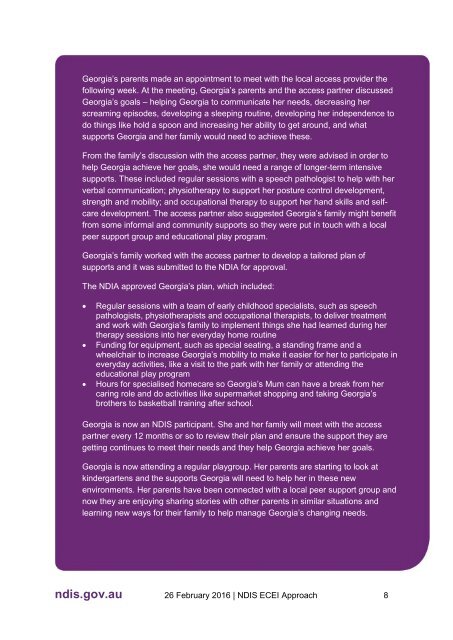NDIS Early Childhood Early Intervention (ECEI) Approach
NDIA-ECEI-Approach-1
NDIA-ECEI-Approach-1
Create successful ePaper yourself
Turn your PDF publications into a flip-book with our unique Google optimized e-Paper software.
Georgia’s parents made an appointment to meet with the local access provider the<br />
following week. At the meeting, Georgia’s parents and the access partner discussed<br />
Georgia’s goals – helping Georgia to communicate her needs, decreasing her<br />
screaming episodes, developing a sleeping routine, developing her independence to<br />
do things like hold a spoon and increasing her ability to get around, and what<br />
supports Georgia and her family would need to achieve these.<br />
From the family’s discussion with the access partner, they were advised in order to<br />
help Georgia achieve her goals, she would need a range of longer-term intensive<br />
supports. These included regular sessions with a speech pathologist to help with her<br />
verbal communication; physiotherapy to support her posture control development,<br />
strength and mobility; and occupational therapy to support her hand skills and selfcare<br />
development. The access partner also suggested Georgia’s family might benefit<br />
from some informal and community supports so they were put in touch with a local<br />
peer support group and educational play program.<br />
Georgia’s family worked with the access partner to develop a tailored plan of<br />
supports and it was submitted to the NDIA for approval.<br />
The NDIA approved Georgia’s plan, which included:<br />
<br />
<br />
<br />
Regular sessions with a team of early childhood specialists, such as speech<br />
pathologists, physiotherapists and occupational therapists, to deliver treatment<br />
and work with Georgia’s family to implement things she had learned during her<br />
therapy sessions into her everyday home routine<br />
Funding for equipment, such as special seating, a standing frame and a<br />
wheelchair to increase Georgia’s mobility to make it easier for her to participate in<br />
everyday activities, like a visit to the park with her family or attending the<br />
educational play program<br />
Hours for specialised homecare so Georgia’s Mum can have a break from her<br />
caring role and do activities like supermarket shopping and taking Georgia’s<br />
brothers to basketball training after school.<br />
Georgia is now an <strong>NDIS</strong> participant. She and her family will meet with the access<br />
partner every 12 months or so to review their plan and ensure the support they are<br />
getting continues to meet their needs and they help Georgia achieve her goals.<br />
Georgia is now attending a regular playgroup. Her parents are starting to look at<br />
kindergartens and the supports Georgia will need to help her in these new<br />
environments. Her parents have been connected with a local peer support group and<br />
now they are enjoying sharing stories with other parents in similar situations and<br />
learning new ways for their family to help manage Georgia’s changing needs.<br />
ndis.gov.au 26 February 2016 | <strong>NDIS</strong> <strong>ECEI</strong> <strong>Approach</strong> 8


